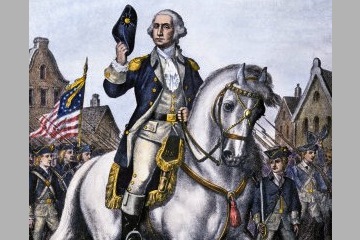George Washington and "Neutrality" in Party Politics
 George Washington
George Washington
One often sees George Washington portrayed as a President above the fray, indifferent to the base and petty disputes of party politics. Indeed, he was the only U.S. President to be unaffiliated with a specific party. But far from being indifferent, Washington had very definite ideas about the political direction of the United States. If anything, he attempted to take very political issues and raise them "above politics" by attaching his approbation to them. At heart, Washington was a supporter of the Federalist program.
Washington's presence at the Constitutional Convention was itself an implicit advocacy for the federal system. After the success of the Revolution, Washington made much of his glorious and principled resignation and retirement. Without the tumult of Shays' Rebellion, he might have remained in such a state for the remainder of his life. It was his viewpoints on a stronger central government that brought him back into politics to begin with.
President George Washington took strong stances in favor of a national bank, a stronger central government, a tariff, and other issues that would soon define the American politics of the early 19th century. He appointed Alexander Hamilton as the nation's first Secretary of the Treasury and supported his efforts to create the First Bank of the United States. While declaring official neutrality, he generally sympathized with Britain in the European disputes that followed the French Revolution. Both of these were highly controversial issues of the day, and these stances were opposed by influential thinkers such as Thomas Jefferson and James Madison.
However, Washington did not present himself as a political figure. When he took action or made appointments, he presented them as the common-sense conclusions brought to him by reason and wise counsel. For him, political parties and opposition to obviously correct policies were the result of opportunism and antipathy. In his Farewell Address, he wrote, "The alternate domination of one faction over another, sharpened by the spirit of revenge, natural to party dissension, which in different ages and countries has perpetrated the most horrid enormities, is itself a frightful despotism."
But of course, there is a larger question. Where lies the point that legitimate issues of political disagreement cross over into petty, political vindictiveness? At what point is an opponent arguing from self-interest, rather than concern for the future of the country?
Washington took a narrow view of the question and strongly advocated national unity. He was neither the first nor the last authority to take this stance. But of course, it is as much self-interest for one in power to argue for unity, as it is for one not in power to argue for debate and respect of alternate viewpoints. It is always better, if one can manage it, to present their program as something so acclaimed and agreed upon as to be above politics. How many times has a President praised a platform of action as "common-sense" and "non-political" and criticized the "obstructionists" opposing them? Be it the case of Harry Truman and the "Do-Nothing Congress", or George W. Bush and the maneuvers after 9-11, such rhetoric has a long history and a long future in American politics.